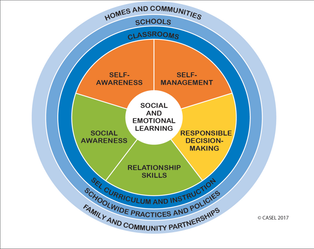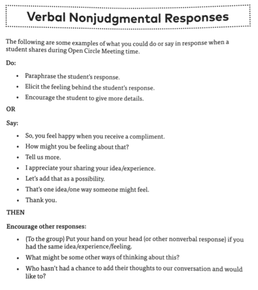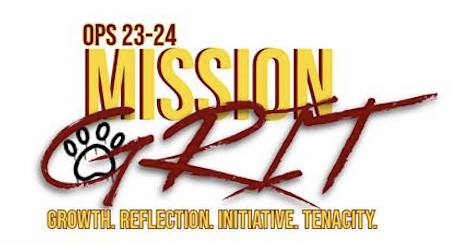|
Mission: G.R.I.T.! OPS is on a mission this year! Mission: GRIT! aims to increase the passion and perseverance of our students. Stay tuned for more information about what grit is, why we want it, and how to foster it. In the meantime, please feel free to look through my blog posts for information on a variety of topics. If you're looking for information about counseling resources in the OPS area, click here for emergency mental health hotlines, as well as a list of psychotherapy providers used by other OPS families. PLEASE NOTE: If you or a family member are experiencing the signs or symptoms of a mental illness and feel you are in crisis, call 201-262-HELP (4357) or dial 911.
|
 Welcome back! (and Welcome to our incoming Kindergarten class!) In the coming days or weeks, you are likely to hear your child talk about something called Open Circle. If you haven't heard of it before, Open Circle is a social-emotional learning (SEL) program used by schools nationwide to develop children's social-emotional skills and help schools develop a safe and engaging community. What does all this mean? Please allow me to explain. What is SEL? Social-Emotional Learning (SEL) is defined as "the process through which children and adults understand and manage emotions, set and achieve positive goals, feel and show empathy for others, establish and maintain positive relationships, and make responsible decisions." This definition comes from the Collaborative for Academic, Social and Emotional Learning (CASEL), the organization that has informed much of NJ's educational standards on SEL. CASEL identifies five "core competency" areas of social and emotional learning: 1. Self-awareness: The ability to recognize one's emotions, thoughts, values, strengths and limitations and how they influence behavior 2. Self-management: The ability to successfully regulate one's emotions, thoughts, and behaviors to effectively manage stress, control impulses, and motivate oneself toward one's goals. 3. Social awareness: The ability to take the perspective of others, empathize, appreciate diversity and respect others, as well as recognizing social and ethical norms for behavior and the resources and supports available from family, school and community. 4. Relationship Skills: The ability to form positive relationships, communicate clearly, listen effectively, cooperate with others, negotiate conflict constructively, and seek & offer help when needed. 5. Responsible Decision-making: The ability to make safe, ethical, constructive choices about one's behavior that shows consideration for the consequences to self and others. The goal of any CASEL-based SEL program is to develop children's competence in these areas. Could you imagine if your child had all the above skills and abilities? Could you imagine if YOU had them? I know I'm still working on them! It's important to note that perfection is not the goal. This is a life-long process and we are all bound to make mistakes from time to time, but the sooner we start, the longer we have to reap the rewards of our efforts. Why SEL? SEL teaches the "people skills" like communication, teamwork, and problem-solving that most employers look for when hiring. These are the skills that many consider "hard to teach" on the job. But they are learned. Whether by watching the adults in their lives, copying the behavior of other children, or from the media (Remember Mr. Rogers? Little House on the Prairie? Tom & Jerry? Bugs Bunny?), kids are learning, for better or worse, how to handle themselves and others. Lessons are often learned the hard way and/or by trial and error. Some catch on quickly and even learn how to manipulate those around them. Others never seem to consciously understand why they do the things they do, or the impact of their actions on others. Sadly, too many never learn sufficient coping skills to face life's challenges, and later resort to "numbing" behaviors like drug/alcohol abuse or worse. Rather than leave it to chance, why not explicitly teach children about their feelings, goals, and motivations? Study after study conducted over the past two decades has documented the positive impact of school-based SEL programs on the lives of children. Benefits include: - better social-emotional skills; - improved attitudes about self, others, and school; - less emotional stress; - an increase in positive classroom behavior; - fewer behavior problems; - an increase in scores on academic achievement tests; and - a lower incidence of drug use. In fact, SEL programs that address CASEL's five core competencies have been found to increase students' academic performance by 11 percentile points. Furthermore, the positive impact of SEL is evident for many years after children have received the instruction. In fact, one study by Columbia University found that for every $1 invested in SEL instruction, $11 are saved from costs not incurred for intervention(s). (Links to more detailed information on the studies mentioned can be found here.)
 The goals of the Open Circle program are: 1. To proactively develop children's skills for recognizing and managing emotions, empathy, positive relationships and problem solving; and 2. To help schools develop a community where students feel safe, cared for, and engaged in learning. In the classroom: Twice each week during the whole school year, each class will meet in a circle for approximately 15-20 minutes. Children bring their chairs to an agreed-upon area of the room and sit in a circle leaving one open chair - thus, the name Open Circle. The open chair symbolizes the idea that there's always room for one more person, idea, or opinion; Everyone is welcome and no one is ever left out. Once in the open circle, the teacher presents the lesson for the day. Each lesson was written by Open Circle to ensure continuity among classes and between grades. This promotes a shared vocabulary the whole school will use when discussing social-emotional issues. However, each classroom's experience of that lesson will differ depending on what the teacher and children bring to the open circle. For example, in the lesson on Positive Self-Talk, all students (school-wide) will learn that positive self-talk means "saying encouraging things to yourself." However, when the teacher asks for examples or input from the class, each class will have a unique experience depending on what the students share in terms of their own self-talk, when or why they've needed to use it, and how it affects them. At the heart of Open Circle is the relationship between students and teacher. During Open Circle, this relationship is facilitated in part by the emphasis on nonjudgmental responses. Nonjudgemental responses are responses that paraphrase statements, reflect feelings, or elicit more information without indicating approval or disproval. Often during academic discussions, there is a "right" or "wrong" answer. In Open Circle, we try to find the value in each response so that in return, each student feels valued. When students know their teacher (and classmates) value them, they start to feel they belong, and a classroom community begins to take shape. An overview of the curriculum, including sample lessons, can be found on the "Curriculum" page of the Open Circle website. At home: Wondering how you can help? Homelink is a letter sent home by your child's teacher after an Open Circle lesson explaining what your child has learned. Homelink invites you to continue the lesson at home and incorporate the skills taught into your family. Other resources available to families include children's literature recommendations and information about mindfulness practices. Click here to download a sample lesson plan that includes a Homelink letter in English and Spanish. Impact As you might imagine, having an experience like Open Circle twice each week has the potential to change a student's entire outlook on school. By setting aside the time to talk about our inner worlds, students are likely to learn just how similarly we each think and feel. Too often, children (especially) keep their inner worlds to themselves and go through much of their lives thinking they're the only ones who think and feel the way they do. By creating a safe place to have these conversations at a young age, children will hopefully learn they don't need to hide what they think and feel because we all go through the same things at times. And where there are differences, there's the opportunity to learn from, appreciate, and respect those differences. School becomes a place where they feel connected, accepted, and safe. Studies conducted to measure the impact of Open Circle have found significant improvements in social skills and problem-solving behaviors, an increase in self-assertiveness and self-control, and fewer problems with physical fighting. Please explore Open-Circle.org for testimonials from students and teachers about the impact the program has had on their school, community, and lives. In the end, SEL programs like Open Circle build the community and teach the skills students need to better navigate life's experiences. If you have any questions about the Open Circle program or any of the lessons your child learns throughout the year, please feel free to reach out to me anytime. I'll always do my best to explain the philosophy and/or science behind both the process and content of each lesson.
2 Comments
Jeremy Griffin
9/12/2019 08:10:40 am
This is wonderful information. Thanks for sharing and adding this to the priorities at the school.
Reply
Rima Mason
9/12/2019 11:34:45 am
Glad you found it helpful!
Reply
Leave a Reply. |
AuthorAll blog posts written by Rima Mason, MA, LPC unless otherwise noted. Blog list by title2023-2024 year: 2020-2021 year: 2019-20 year: 2018-19 year:
Archives
December 2023
Categories |

